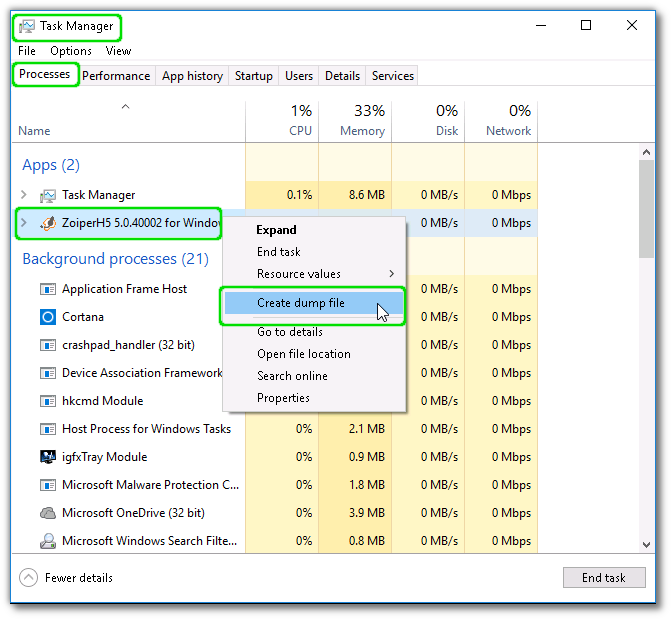Often requested log files.
There are different log files that might be required for a successful investigation.
- debug log - contains general information about the events taking place and the softphone configuration.
- packet capture log - contains information about the network packets sent to and by the softphone.
- dump file - creates a dump in case Zoiper's interface froze.
- crash log- contains valuable information in case Zoiper crashed in the middle of an action.
- Other log files, that are not listed here, may also be requested by our Support team.
Usually a packet capture file is always requested along with a debug log file.
Note: Before preparing a set of log files, make sure that all non-strictly required settings such as STUN, Rport, KPML, MWI, Presence, etc. are disabled.
Debug log
A debug log is created only if the debug logger is ON. It contains detailed information about the events that took place, such as account registration, network status, configuration status, etc. It is usually required by our developers for their investigation.
Turn ON the debug logger by using the Settings window:
- Open the Settings window by clicking the button on the main Zoiper screen and Help/About;
- Click on Enable debug log;
- click on the checkbox to activate the Debug logger;
- press "close" or "back" to go back and save the changes;
- now exit the softphone and then start it again to create the log file.
Now the debug logger is ON.
A file named logfile_XXXXX_YYYYY.txt will be created in the Application Data\ZoiperH5 folder for the currently logged user. It is C:\Program Data for some Windows flavors.
XXXXXX is date and YYYYYY is time.
How to access it?
- Open the Windows File explorer;
- type %APPDATA% in the addressbar
- hit the Enter key.
- Then open the folder named ZoiperH5 and locate the log file.
When the issue is recreated, please exit Zoiper to make sure that the log contains only relevant information.
If you do not need the debug logger ON, you can disable it by using the Settings -> Help/About -> Enable Debug log window.
Packet capture log
A packet capture log file is required so our developers could follow the network packets sent and received by Zoiper.
The capture contains information about account registrations, configuration details, etc.
To create the packet capture file you could use an application like Wireshark.
Wireshark is a useful tool for taking packet captures and network monitoring.
You can download it here:
http://www.wireshark.org/download.html
Wireshark documentation is available here:
http://www.wireshark.org/docs/
Here is our basic PDF tutorial about how to make a packet capture.
Make sure Zoiper is not running, then start Wireshark, select the currently active network interface and start capturing.
Then start Zoiper and recreate the issue.
When done, exit Zoiper, then stop capturing and save the capture as a file.
Send this file to us along with a debug log file from the same session.
Dump file
A dump file would provide valuable information in case Zoiper froze in the middle of an action.
Right click on the Windows taskbar -> Task manager -> select Processes -> More details;
Right click on Zoiper, then select "Create dump file".

After the file is created you will need to save it to a safe location.
Crash log
A crash log is usually created automatically.
It is located in the Application Data\ZoiperH5\reports folder for the user that started Zoiper.
Open a file browser, type %APPDATA% in the address bar, press Enter, then find the ZoiperH5\reports folder.
Note that you will need to attach the file to your email as a plain attachment or in a zip archive. Copy pasting it will ruin its contents.
If the files are too large to be sent by email, upload them to your dropbox / googledrive / cloud account and send the download link to our support team.
